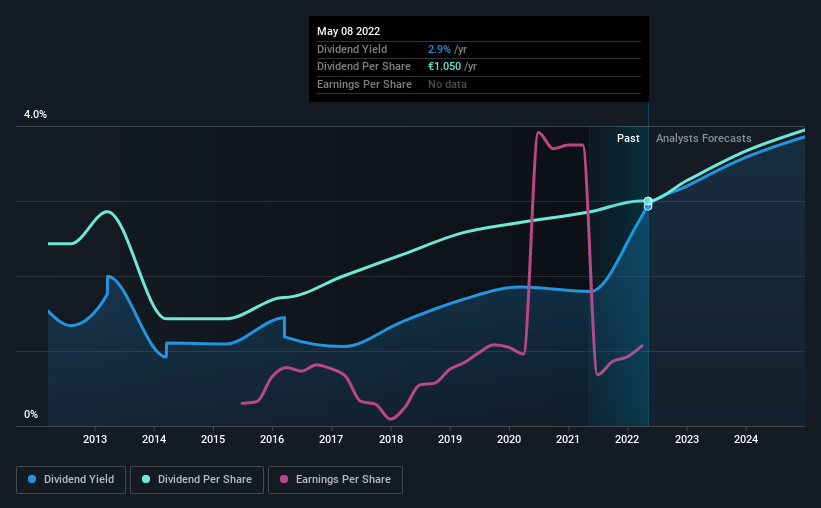
LANXESS Aktiengesellschaft (ETR:LXS) will increase its dividend on the 31st of May to €1.05. Although the dividend is now higher, the yield is only 2.9%, which is below the industry average.
While the dividend yield is important for income investors, it is also important to consider any large share price moves, as this will generally outweigh any gains from distributions. LANXESS' stock price has reduced by 32% in the last 3 months, which is not ideal for investors and can explain a sharp increase in the dividend yield.
See our latest analysis for LANXESS
LANXESS' Earnings Easily Cover the Distributions
While yield is important, another factor to consider about a company's dividend is whether the current payout levels are feasible. Prior to this announcement, LANXESS' earnings easily covered the dividend, but free cash flows were negative. In general, we consider cash flow to be more important than earnings, so we would be cautious about relying on the sustainability of this dividend.
Over the next year, EPS is forecast to expand by 33.2%. Assuming the dividend continues along recent trends, we think the payout ratio could be 29% by next year, which is in a pretty sustainable range.

Dividend Volatility
The company's dividend history has been marked by instability, with at least 1 cut in the last 10 years. Since 2012, the dividend has gone from €0.85 to €1.05. This works out to be a compound annual growth rate (CAGR) of approximately 2.1% a year over that time. We're glad to see the dividend has risen, but with a limited rate of growth and fluctuations in the payments the total shareholder return may be limited.
The Dividend Looks Likely To Grow
Given that the dividend has been cut in the past, we need to check if earnings are growing and if that might lead to stronger dividends in the future. LANXESS has seen EPS rising for the last five years, at 10% per annum. A low payout ratio and decent growth suggests that the company is reinvesting well, and it also has plenty of room to increase the dividend over time.
Our Thoughts On LANXESS' Dividend
Overall, we always like to see the dividend being raised, but we don't think LANXESS will make a great income stock. While the low payout ratio is redeeming feature, this is offset by the minimal cash to cover the payments. We would probably look elsewhere for an income investment.
Market movements attest to how highly valued a consistent dividend policy is compared to one which is more unpredictable. At the same time, there are other factors our readers should be conscious of before pouring capital into a stock. Just as an example, we've come across 5 warning signs for LANXESS you should be aware of, and 1 of them is a bit concerning. If you are a dividend investor, you might also want to look at our curated list of high yield dividend stocks.
If you're looking to trade LANXESS, open an account with the lowest-cost platform trusted by professionals, Interactive Brokers.
With clients in over 200 countries and territories, and access to 160 markets, IBKR lets you trade stocks, options, futures, forex, bonds and funds from a single integrated account.
Enjoy no hidden fees, no account minimums, and FX conversion rates as low as 0.03%, far better than what most brokers offer.
Sponsored ContentNew: AI Stock Screener & Alerts
Our new AI Stock Screener scans the market every day to uncover opportunities.
• Dividend Powerhouses (3%+ Yield)
• Undervalued Small Caps with Insider Buying
• High growth Tech and AI Companies
Or build your own from over 50 metrics.
Have feedback on this article? Concerned about the content? Get in touch with us directly. Alternatively, email editorial-team (at) simplywallst.com.
This article by Simply Wall St is general in nature. We provide commentary based on historical data and analyst forecasts only using an unbiased methodology and our articles are not intended to be financial advice. It does not constitute a recommendation to buy or sell any stock, and does not take account of your objectives, or your financial situation. We aim to bring you long-term focused analysis driven by fundamental data. Note that our analysis may not factor in the latest price-sensitive company announcements or qualitative material. Simply Wall St has no position in any stocks mentioned.
About XTRA:LXS
LANXESS
Operates as a specialty chemicals company that engages in the development, manufacture, and marketing of chemical intermediates, additives, specialty chemicals, and consumer protection products worldwide.
Good value with moderate growth potential.
Similar Companies
Market Insights
Community Narratives


